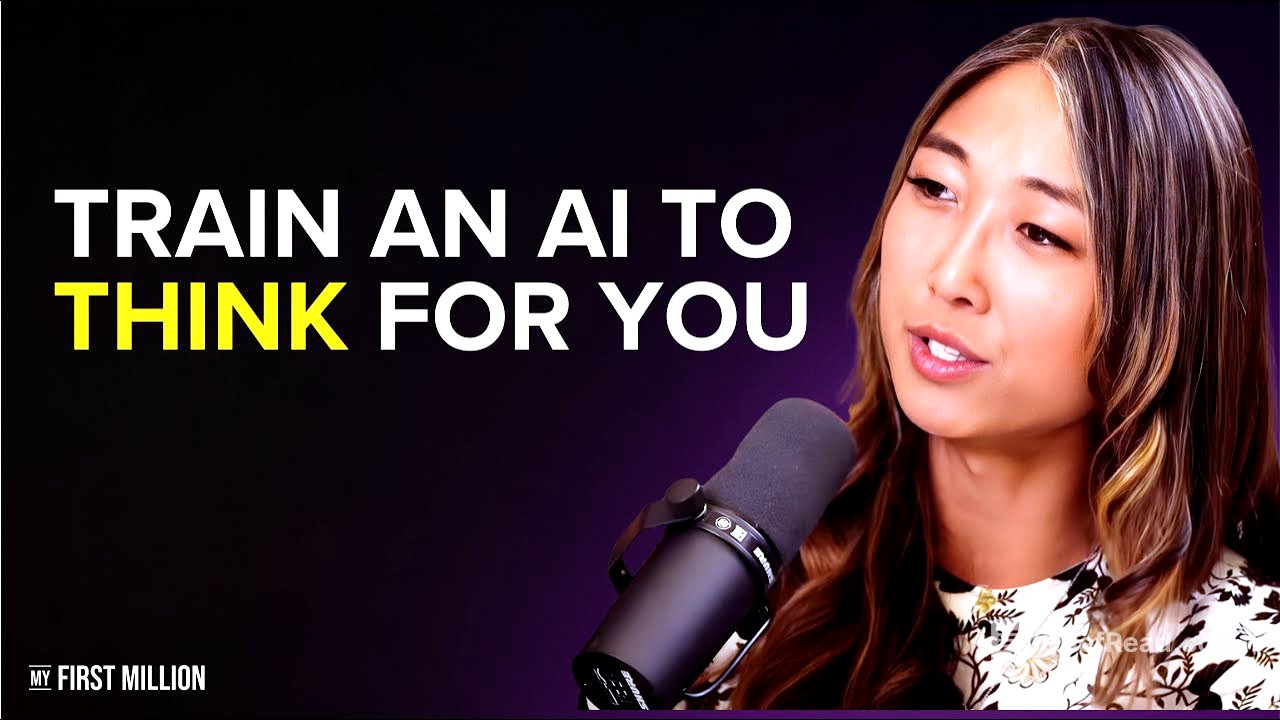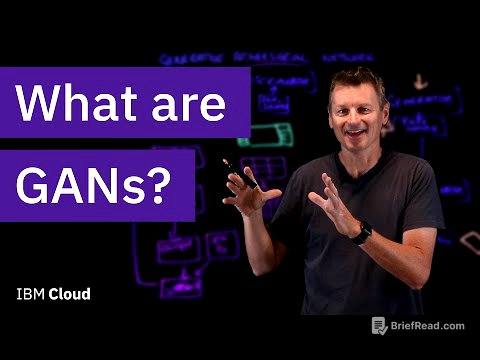TLDR;
This episode features a discussion with Jess, a serial entrepreneur, about idea generation, business strategies, and personal philosophies. Jess shares her approach to finding and developing business ideas, emphasizing the importance of conversations, networking, and a willingness to experiment. She also discusses the realities of entrepreneurship, including failures and the importance of mindset.
- Importance of diverse information sources and real-world conversations for idea generation.
- The value of a strong team and the willingness to iterate on ideas.
- The significance of mindset, including embracing failure and playing to win.
Intro: Private Jet Flex and Tax Benefits [0:17]
The episode starts with a discussion about the private jet they are on. The speaker clarifies that owning a plane isn't just about flexing wealth but can be a practical financial decision due to tax benefits. A $12 million airplane can be financed with a 20% down payment, and the entire amount can be written off on taxes through accelerated depreciation. This makes it a potentially sound financial strategy for high-income individuals and businesses. The plane also enables efficient travel, allowing for quick day trips and maintaining productivity with Starlink internet.
Jess's Entrepreneurial Background and Philosophy [5:30]
Jess shares her background, starting her first company, Intaneo, at age 19 and later co-founding multiple companies with nine-figure valuations. She explains her strategy of focusing on creating multiple smaller, successful businesses rather than pursuing unicorns, which often leads to stress and less control for the founders. Jess emphasizes the importance of lifestyle and curiosity over solely focusing on impact or building a unicorn. She also shares her talent playbook, recruiting guide, and operations guide in the show notes.
Idea Generation Process: The Idea Hopper [8:43]
Jess describes her process for generating business ideas, which involves scraping ideas from various sources, including Y Combinator's request for startups and Reddit. She also emphasizes the importance of one-on-one conversations and brainstorming sessions. Jess maintains an "idea hopper" on her phone with around 300 ideas. She evaluates ideas based on criteria such as complexity, bootstrap potential, and recurring revenue.
Business Idea 1: Doge as a Service [11:11]
Jess shares an idea called "Doge as a Service," a software platform that tracks employee activity on platforms like Slack and email to identify and eliminate unproductive employees. This service could be offered to companies or consulting firms like McKinsey to help them demonstrate cost savings to their clients.
Business Idea 2: Vertical Agent as a Service [13:31]
Jess introduces the concept of "Vertical Agent as a Service," which involves building a library of AI agents tailored to specific industries, such as dental offices or auto mechanics. This approach automates tasks and provides plug-and-play solutions for businesses in those sectors. She references Constellation Software's model of acquiring and rolling up vertical SaaS companies as a potential future trend.
Business Idea 3: Cargo Ship Coating [16:51]
Jess shares a random idea about developing specialized coatings for cargo ships to improve their efficiency and reduce fuel consumption. This idea came from a conversation with someone who was previously exploring funding such a project.
Turning Yourself into an API for Ideas [17:43]
The discussion shifts to how to become a source of ideas. Jess explains that she initiates conversations with people likely to have ideas and has positioned herself as someone who is always interested in hearing interesting, off-the-beaten-path ideas. This makes her an "API" for ideas, as people associate her with a desire for innovative concepts.
Business Idea 4: Holy Health [21:26]
Jess presents "Holy Health," an idea inspired by a company that helps a niche of medical providers gain access to insurance. The concept involves banding together small medical providers like chiropractors and physical therapists to negotiate with insurance companies for reimbursement. This would include a full stack of services, including customer acquisition and AI agents.
The Importance of the Info Diet and Thinking with AI [23:17]
Jess emphasizes that her ideas come from in-person conversations rather than online content. She asks people about exotic, cash-minting business ideas they've seen and filters them based on replicability, scalability, and AI risk. She also uses AI tools like ChatGPT to brainstorm names and refine ideas. Jess highlights Microsoft CEO Satya Nadella's workflow of "think with AI and then work with my co-workers."
Digital Twins and R&D Team Meetings [25:50]
Jess discusses her team's use of digital twins, created by recording meetings and feeding the transcripts into AI models. This allows for brainstorming and refining ideas with AI versions of team members and other influential figures. She also describes her R&D team meetings, where ideas are pitched and evaluated based on their potential for cash flow, limited funding needs, and defensibility.
The Iterative Process and the Value of Ideas [28:50]
Jess explains that her team focuses on advancing a limited number of ideas at a time, with specific tasks assigned to each member. They aim to gather insights and upgrade ideas through conversations and research, assuming that the initial idea is flawed and will require multiple pivots. Jess argues against the Silicon Valley mantra that "ideas are worthless," stating that a bad idea can doom even a great team.
The Starving Crowd and the Importance of Acute Problems [35:45]
The conversation touches on the importance of finding a "starving crowd" – customers with a real pain and a desire to solve it. Jess emphasizes that a hallmark of a good idea is that the customer doesn't have to pay anything upfront, as in the "Holy Health" model where providers make more money by joining the platform.
Divorce Financing and Embracing Failures [37:56]
Jess briefly mentions a "divorce financing" idea and then transitions to discussing failures. She shares examples of failed ventures, such as "Cred Boost," a credit repair business, and a program to help veterans find jobs. She emphasizes the importance of honesty about struggles and the need to learn from mistakes.
Inner Monologue and Mindset of Great Entrepreneurs [44:00]
Jess shares a personal email from a difficult time in her entrepreneurial journey, highlighting the pressure and self-doubt she faced. She emphasizes the importance of inner monologue and the need to diagnose problems and keep trying. The key mindset components are: ignorance of the past, realistic about the present, and delusional about the future.
Playing to Win vs. Playing Not to Lose [48:23]
Jess discusses the concept of "playing to win" rather than "playing not to lose," which involves being optimistic, trying new things, and not being limited by a scarcity mindset. She uses the example of buying a plane as a manifestation of this attitude. She also shares how she hired an event planner to create serendipitous gatherings of inspiring people.
Collecting Eccentric People and Engineering Serendipity [53:18]
The conversation explores the idea of collecting interesting people and engineering serendipity. Jess describes her approach to finding and connecting with people who are outside the box, fun, and have interesting ideas. She also shares examples of low-cost ways to create serendipitous events, such as museum tours or singles events.
Current Nerding Out: Cancer, Longevity, and Bioelectricity [56:12]
Jess shares her current interests in cancer research, longevity, and bioelectricity. She discusses the work of scientist Mike Levin, who is using bioelectricity to normalize cancer cells. She also touches on the potential of AI in medicine and biology, while acknowledging the regulatory challenges.
Contact Information and Final Thoughts [58:38]
Jess encourages listeners to connect with her on LinkedIn and share their exotic business ideas. She also mentions the positive connections she made after her previous podcast appearance. The episode concludes with a thank you and a sense of community.









